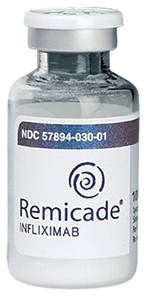 Synthetic antibody formulation infliximab may be an effective component of a drug regimen for patients with inflammatory bowel disease (IBD) such as Crohn’s disease and ulcerative colitis. While a number of past reports claimed the drug to be ineffective, a recent study revisited infliximab and found it may work best after a “drug holiday.”
Synthetic antibody formulation infliximab may be an effective component of a drug regimen for patients with inflammatory bowel disease (IBD) such as Crohn’s disease and ulcerative colitis. While a number of past reports claimed the drug to be ineffective, a recent study revisited infliximab and found it may work best after a “drug holiday.”
Dr. Filip Baert, a gastroenterologist in the University Hospitals Leuven in Belgium and lead author of the study, said that infliximab proved to be highly beneficial in patients that were on other treatments. The favorable response to the drug was particularly evident in patients who were taken off infliximab, but did not find relief with subsequent alternatives. The study is currently available in Clinical Gastroenterology and Hepatology of the American Gastroenterological Association, entitled, “Decreased mucosal lymphocyte proliferation following treatment with infliximab in Crohn’s disease.”
Infliximab is widely known as the first anti-tumor necrosis factor (TNF) indicated for IBD. While it is still prescribed today, some studies revealed the drug loses efficacy by 13 percent every year of treatment.
The study involved restarting infliximab on 128 IBD patients. 7 of these patients were noted to have a severe infusion reaction during the 2nd or 3rd dose. These incidents underscore the need for prompt and accurate pharmacologic monitoring, and a conjunctive administration of an immunomodulator when re-treating with the drug.
While restarting a patient on a previously failed treatment has some risks, such as late onset hypersensitivity, Dr. Baert concludes that the strong potential of patients finding symptom relief with infliximab after a considerable drug holiday should not be neglected.
Another anti-TNF drug called Adalimumab recently produced promising results during a study at the University of California. According to the researchers, prolonged treatment of up to 4 years is beneficial in cases of moderate to severely active ulcerative colitis.

